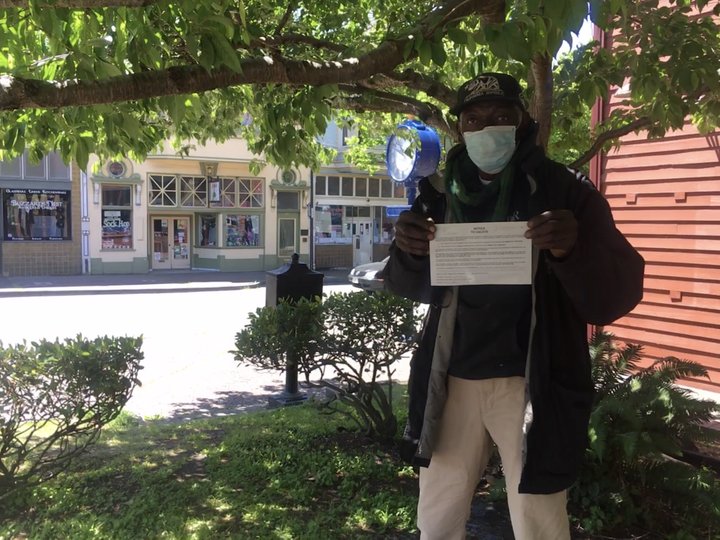
Ben Anderson holding his notice to vacate in Old Town Eureka | Photo by Freddy Brewster
Ben Anderson and his wife sat on a blanket with their belongings in the shade of a tree by the Old Town Gazebo on Monday. Since coming to Humboldt County in 2018, the two have mainly called the streets home. Anderson is from Illinois and continues to stay in the County while he fights to regain custody of his child, who is in the Child Welfare Services program.
Anderson and his wife — who declined to be named — are both aware of the COVID-19 pandemic and are among the many in Humboldt who are “sheltering in place” without an actual shelter. There are a number of services still available for the unhoused community, however a lot of the programs have been rolled back, such as the job skills training and the Pathway to Payday programs run by Uplift Eureka. Interviews with local agencies and some members of the unhoused community have highlighted the complications of life for the unhoused during the pandemic, as well as the difficulty in providing them with needed services.
Anderson said he tried to get into the temporary emergency tent shelter in Arcata but was told it was full and not taking any new occupants.
“They have tent shelters but they are always full, and actually the tent shelters have become, at this particular time, not healthy places,” Anderson told the Outpost. He said he fears he will not be able to maintain a proper distance while at the shelters.
In fact, Darlene Spoor, director of the Arcata House Partnership, the agency in charge of the tent shelter, said the Humboldt County Office of Emergency Services has asked her organization to start scaling down its operations.
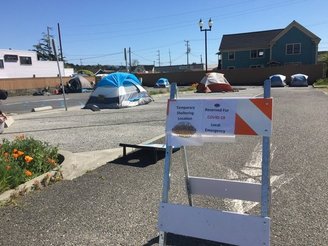
Arcata’s temporary emergency tent shelter | File photo
“This is funded through the Office of Emergency Services and so we are scaling down now,” Spoor told the Outpost. “They’ve asked us to not put any new people into the tent or hotel emergency shelter program.”
When asked where people can go since the tent shelter is no longer accepting people, Spoor said, “I have no idea.”
But she did say the tent shelter has been a success, providing shelter for 73 people since April 8. Spoor said AHP helped an additional 50 people who are on the streets with food and welfare services.
Spoor and others at AHP have helped 41 occupants find more permanent housing. Some have moved on to AHP’s own permanent housing program; others have gone to Betty Chinn’s Blue Angel Village or the Eureka Rescue Mission, and 24 of the occupants moved into county-funded hotel rooms. Spoor has also seen a change in attitude from the occupants.
“Having people have a place to be and a place to sleep and knowing that they are getting food the next day has greatly reduced people’s negative behaviors,” Spoor said. “They have a place to be. They are not walked over every day. Every day somebody sees them.”
She said the occupants are taking care of the lot and keeping it clean. They have been sweeping up any garbage and landscaping the surrounding area. Spoor also gave an example of one gentleman who struggled with sobriety for years and now he is clean because, as Spoor put it, he doesn’t have to worry about violence on the streets or where he is going to sleep.
“He’s been clean and sober for about a month,” she said. “We are seeing all kinds of negative behaviors change dramatically because in these emergency tents and hotel shelters, we treat people with respect.”
Like the Arcata House Partnership, the Eureka Rescue Mission has had some success at finding people housing during the current pandemic. Brian Hall, the director of the Mission, told the Outpost that staff at the Mission and its women’s shelter have been able to get permanent housing for 11 people in the past month.
“Our women’s shelter director has connected with a local realtor and when she has a good family or a woman and child… they are willing to work with us and put people in housing,” Hall said.
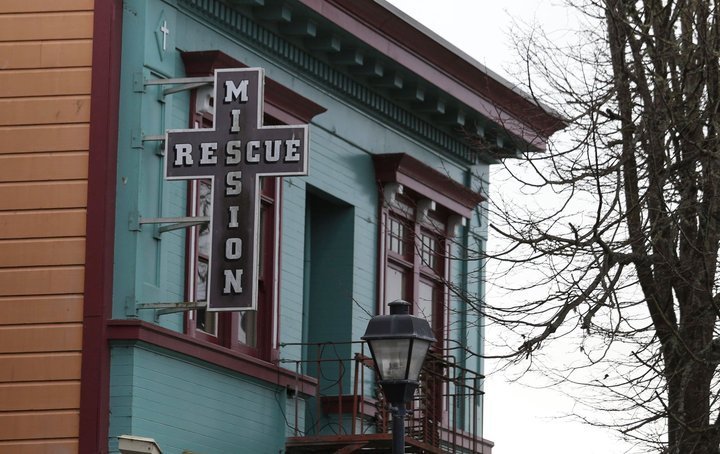
Eureka Rescue Mission | File photo
However, the Mission has been forced to restrict admittance. Hall said the people from the hospital that have been cleared are allowed to enter, but it is not business as usual for the residents. He also said the Mission is taking on people recently released from the Humboldt County jail for short-term stays until they are able to move in with friends or a next of kin. Recent releases from the jail and hospital aren’t necessarily given priority, Hall said, but staff members at the Mission are being more cautious about who they let in.
“Right now we are not open for business like we normally are, bringing in 70-80 people a night,” Hall said. “As a matter of fact, everyone coming in needs to be screened. We ask them the protocol questions.”
Hall said he’s been encouraging the residents who get admitted to stay throughout the day. However, if they do leave, there are masks available for them to use. Hall said he wishes more of the unhoused community decided to stay at the Mission. He said they are a tight-knit group and often have movie and popcorn nights. But, ultimately, he understands why some choose to stay out on the streets. The Mission is small and cramped at times and other reasons include people, property and pets — the three Ps that serve as a barrier when it comes to housing for the homeless because they are reluctant to part ways with them.
When asked why he doesn’t move to the Eureka Mission, Anderson said he wants to stay close to his wife and find a suitable living space in hopes of getting his daughter back from CWS. He also said he has been to Betty Chinn’s, but decided that it wasn’t suitable for his needs
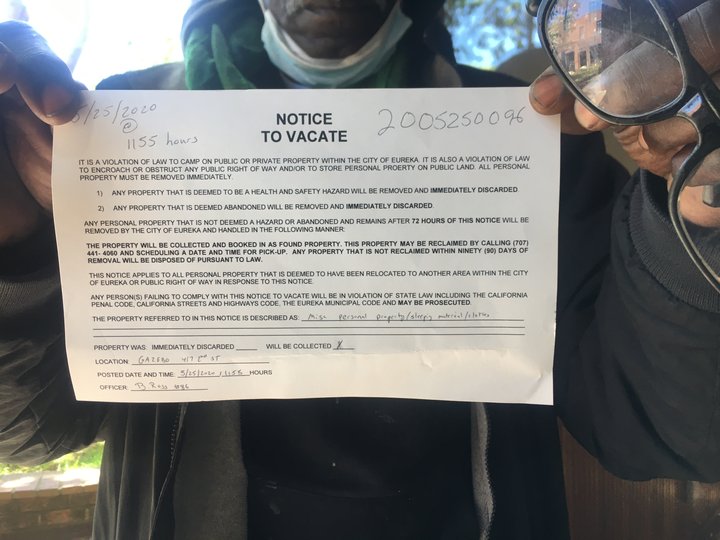
Notice to vacate | Photo by Freddy Brewster
But his time on the streets hasn’t necessarily been tranquil. In the past week alone, Anderson and his wife have received three notices to vacate by the Eureka Police Department. One notice was given to them when they set up in front of Ambrosini and Sons Electric Co., another when they were at Clark Plaza and the third at the Old Town Gazebo — not more than five minutes after the interview with the Outpost concluded.
“It’s this game of, like, wherever we won’t be harassed,” Anderson’s wife said. “[The notices] say something about not being in the doorways, but what is left? You don’t want to give me housing, so what’s left? To me that is abuse of what they claim to have as authority. I have to rest somewhere.”
But Sgt. Leonard La France of EPD’s Community Safety Enhancement Team said the notices to vacate are issued in compliance with a recent federal court ruling out of Boise, Idaho. La France said the ruling essentially states that people have the right to sleep but not to establish an encampment, and the notices are a way of preventing people from setting up in one spot.
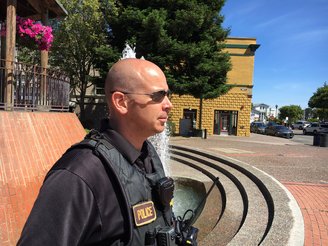
Sgt. Leonard La France | File Photo
“If there is no trace of you being there after nighttime and no one calls about a negative impact, then it is obviously not a big deal to us,” La France told the Outpost. “But if you are there with your stuff and it is scattered and there is trash…, that is a negative impact and that is not okay.”
La France went on to say that the pandemic has been a barrier for them to get people into treatment and rehabilitation centers and off the streets. So far this year, EPD has admitted 25 to 30 people into the Waterfront Recovery Center with 18 admittances in January alone. However, that slowed to just a single person in March and another in April and La France fears that the pandemic will chip away at the progress EPD has made with the local recovery centers.
“With homelessness, if you look at the underlying causes of addiction, mental illness and trauma, we still have to deal with those issues that are existing within the population, but now put COVID on top of that,” La France said. “Man, it is challenging.”
La France also noticed a change in the kind of people who are left out on the streets.
“For the homeless, a lot of the ones that could advocate for themselves were able to get into housing. But we are seeing people on the streets that are the severe mentally ill that really can’t advocate for themselves,” La France said.
He also noticed an increase in the number of people coming to Humboldt from out of the county. Just the other day, La France and another officer issued a notice to vacate to a couple from the Las Vegas area.
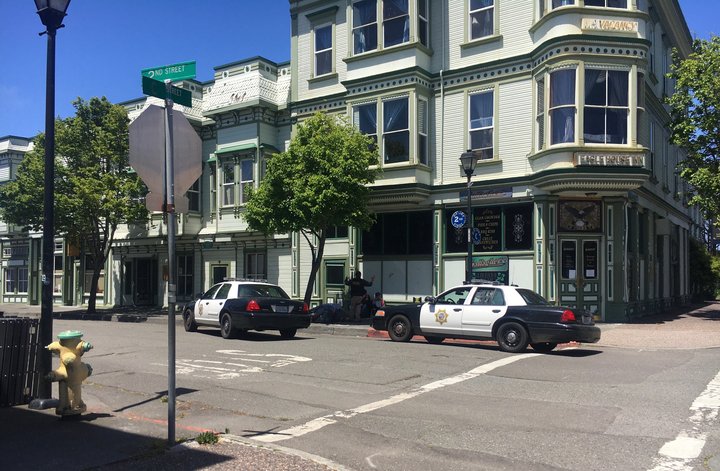
EPD issuing a notice to vacate to a couple from Las Vegas | Photo by Freddy Brewster
“If I had to take a guess, people are probably thinking that Humboldt is a little more rural and they thought it would be a little easier to be here during COVID, but I’m not really sure,” La France said.
However, there is some light to this situation. La France feels that since the City’s Community Safety Engagement Team (CSET) had a working relationship with many of the homeless before the pandemic took off, team members are able to advocate for the ones still on the streets in a way that is meaningful. He stressed that although some of their treatment opportunities have been rolled back, EPD is still doing outreach with its city and county peers.
Jeff Davis, the Community Services supervisor for Uplift Eureka, has been working with CSET at the St. Vincent DePaul Free Meal program. Davis told the Outpost that many of Uplift’s face-to-face programs have been discontinued for the time being, but staff is still out on the streets helping with Free Meal, giving masks and hand sanitizer to the homeless and helping to inform the unhoused community.
“Some of the information they receive might be word-of-mouth and maybe not 100 percent accurate, so we are making sure our community members are informed of what is going on,” Davis said.
The Uplift Eureka team brings an iPad to the Free Meal program and helps walk many of the people through the process of finding jobs and applying for their $1,200 stimulus checks online. Hall said some more tech-savvy residents at the Mission are helping people apply for their checks as well, but nothing official was set up by the Mission or by the Arcata House Partnership.
When asked if the City of Eureka was planning on setting up a tent shelter similar to the one in Arcata, Eureka Community Services Director Miles Slattery said there is not, and he argued that it would be hard to keep people from coming and going.
“The county and public health officer have been discouraging us from doing so,” Slattery told the Outpost, adding that the county’s stance is that COVID-19 could be exacerbated at such an establishment. “That risk outweighs the benefit.”
For now, Eureka is allowing the Affordable Homeless Housing Alternatives shower trailer to return. It will be set up under the 255 bridge in the boat launch parking lot, Slattery said.
La France called a tent shelter a “delicate issue” and said its success or failure hinges on a proper location and good management.
“It’s good to see Arcata doing well with theirs as they have great people operating it,” La France said. “However, they also recognize their ultimate goal is to find permanent housing for these individuals.”
CLICK TO MANAGE